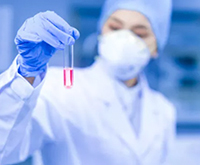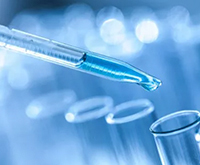Thyroid Stimulating Hormone Receptor (TSHR)
The TSH receptor is a member of the G protein-coupled receptor superfamily of integral membrane proteins.
The thyrotropin receptor (or TSH receptor) locates primarily in the body of the thyroid gland. It recognizes and binds to stimulating thyroid hormone (also known as "thyrotropin") secreted from the pituitary gland.
TSH stimulates the production of thyroxine (T4) and triiodothyronine (T3).
TSHR is closely related to the pathogenesis of various autoimmune thyroid diseases and is an essential indicator for the clinical diagnosis of these diseases.
SEKBIO is now offering Mouse anti-human TSHR mAb, Humanized anti-human TSHR mAb, Recombinant human sTSHR (Soluble), and human TSHR extractive of cell membranes (Full length) for diagnosis usage.
Thyroid Stimulating Hormone Receptor (TSHR) Products
| Antibody | Application |
| Mouse Anti-human TSHR mAb | For immunodiagnostic: ELISA, LFA, CLIA |
| Humanized Anti-human TSHR mAb |
| Antigen | Application |
| Recombinant Human sTSHR (Soluble) | For immunodiagnostic: ELISA, LFA, CLIA |
| Human TSHR Extractive of Cell Membrance (Full Length) |
TSHR
Thyroid-stimulating hormone receptor (TSHR) and its homologous luteinizing hormone/chorionic gonadotropin receptor and follicle-stimulating hormone receptor belong to a class of glycoprotein receptors. They are also visual A member of the large family of G protein-coupled receptors (GPcRs) of rhodopsin (approximately 45% identity at the amino acid level). TSHR is mainly expressed in thyroid follicular cells and activates the protein kinase A (PKA) and phospholipase C (Phospholipases C, PLc) signal transduction systems after combining with thyroid-stimulating hormone (TSH) under physiological conditions. , regulate the growth and differentiation of the thyroid, and promote the synthesis and release of thyroid hormones.
Anti TSH Antibody
The expression of TSHR can also be found in other cells or tissues, including adipocytes, fibroblasts, osteoblasts and osteoclasts, bone marrow cells and cardiomyocytes, etc., and is expressed in embryonic stem cells at an early stage. In autoimmune thyroid diseases, especially toxic diffuse goiter (Graves' disease, GD), TSHR can act as an autoantigen and bind to thyroid-stimulating antibody (TSAb) to produce TSH-like stimulation. The reaction will eventually lead to the loss of thyroid autoimmune tolerance, production and release of excessive thyroid hormones, and clinical manifestations of hyperthyroidism such as palpitations, sweating, and hyperthyroidism. Therefore, studying the structure of thyroid-stimulating hormone receptors and elucidating the interaction between autoantibodies and thyroid-stimulating hormone receptor (TSHR) molecules is vital for understanding Graves disease's pathogenesis, a common organ-specific autoimmune disease, and guiding clinical practice. Diagnosis and treatment have far-reaching significance.


















